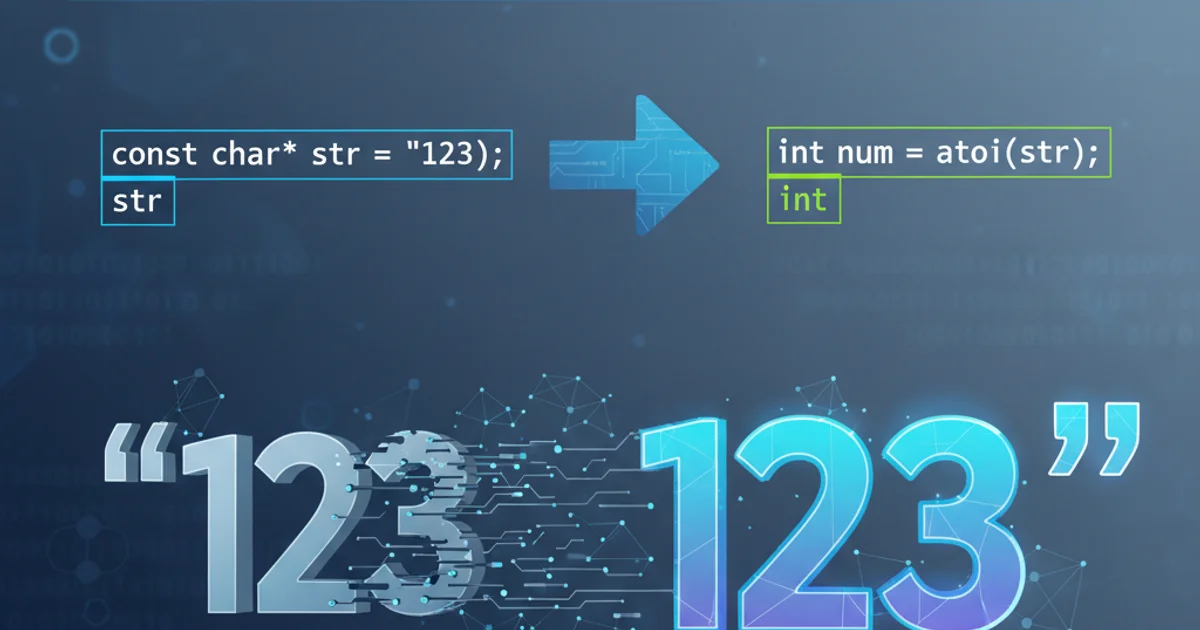How to convert a string to integer in C?
Categories:
Converting Strings to Integers in C: A Comprehensive Guide

Learn the essential methods for converting string representations of numbers into integer types in C, including atoi, strtol, and sscanf, with practical examples and best practices.
In C programming, it's a common requirement to convert a string (an array of characters) that represents a numerical value into an actual integer type. This conversion is crucial when dealing with user input, file parsing, or command-line arguments, as these are typically read as strings. C provides several standard library functions to achieve this, each with its own advantages, limitations, and error handling capabilities. Understanding these differences is key to writing robust and secure code.
The atoi() Function: Simple but Limited
The atoi() function (ASCII to integer) is part of the <stdlib.h> header and provides the simplest way to convert a string to an integer. It takes a null-terminated string as an argument and returns its integer equivalent. However, atoi() has significant limitations, particularly concerning error handling and overflow detection.
#include <stdio.h>
#include <stdlib.h>
int main() {
char str1[] = "12345";
char str2[] = "-678";
char str3[] = "abc";
char str4[] = "123test";
int num1 = atoi(str1);
int num2 = atoi(str2);
int num3 = atoi(str3);
int num4 = atoi(str4);
printf("\"%s\" -> %d\n", str1, num1);
printf("\"%s\" -> %d\n", str2, num2);
printf("\"%s\" -> %d\n", str3, num3);
printf("\"%s\" -> %d\n", str4, num4);
return 0;
}
Basic usage of atoi() for string to integer conversion.
atoi() is its lack of error reporting. If the string does not represent a valid integer (e.g., "abc"), atoi() returns 0. If the converted value overflows the int type, the behavior is undefined. This makes atoi() unsuitable for situations where robust error checking is required.The strtol() Function: Robust Conversion with Error Handling
For more robust and safer conversions, the strtol() function (string to long integer) is highly recommended. Also found in <stdlib.h>, strtol() offers comprehensive error checking, including detection of invalid characters and overflow/underflow conditions. It converts a string to a long int and allows specifying the base of the number (e.g., 10 for decimal, 16 for hexadecimal).
flowchart TD
A[Start: Call strtol("string", &endptr, base)] --> B{Check endptr == string?}
B -- Yes --> C[Error: No digits found]
B -- No --> D{Check *endptr != '\0'?}
D -- Yes --> E[Warning: Trailing characters exist]
D -- No --> F{Check errno for ERANGE?}
F -- Yes --> G[Error: Overflow/Underflow]
F -- No --> H[Success: Conversion complete]
C & E & G & H --> I[End]Decision flow for error checking with strtol().
#include <stdio.h>
#include <stdlib.h>
#include <errno.h>
int main() {
char str[] = "12345test";
char *endptr;
long val;
errno = 0; // Clear errno before the call
val = strtol(str, &endptr, 10);
// Check for various error conditions
if (endptr == str) {
fprintf(stderr, "Error: No digits were found.\n");
} else if (errno == ERANGE) {
fprintf(stderr, "Error: Value out of range for long int.\n");
} else if (*endptr != '\0') {
fprintf(stderr, "Warning: Trailing characters found: '%s'\n", endptr);
printf("Converted value up to invalid character: %ld\n", val);
} else {
printf("Successfully converted: %ld\n", val);
}
// To convert to int, cast the long value after validation
if (val > INT_MAX || val < INT_MIN) {
fprintf(stderr, "Error: Converted long value exceeds int range.\n");
} else {
int int_val = (int)val;
printf("Converted to int: %d\n", int_val);
}
return 0;
}
Using strtol() with comprehensive error checking.
errno to 0 before calling strtol() and check its value afterward to detect overflow/underflow. Also, check endptr to ensure the entire string was converted and that valid digits were found.Using sscanf() for Formatted Input Conversion
The sscanf() function, from <stdio.h>, offers another flexible way to convert strings to integers, especially when dealing with strings that follow a specific format. It works similarly to scanf() but reads from a string instead of standard input. While powerful for parsing formatted data, its error handling for simple conversions can be less direct than strtol().
#include <stdio.h>
int main() {
char str1[] = "Value: 123";
char str2[] = "-456";
char str3[] = "abc";
int num;
int result;
result = sscanf(str1, "Value: %d", &num);
if (result == 1) {
printf("\"%s\" -> %d\n", str1, num);
} else {
printf("Failed to convert \"%s\"\n", str1);
}
result = sscanf(str2, "%d", &num);
if (result == 1) {
printf("\"%s\" -> %d\n", str2, num);
} else {
printf("Failed to convert \"%s\"\n", str2);
}
result = sscanf(str3, "%d", &num);
if (result == 1) {
printf("\"%s\" -> %d\n", str3, num);
} else {
printf("Failed to convert \"%s\"\n", str3);
}
return 0;
}
Example of sscanf() for string to integer conversion.
sscanf() indicates the number of items successfully matched and assigned. For a single integer conversion, a return value of 1 signifies success. A return value of 0 or EOF indicates failure.